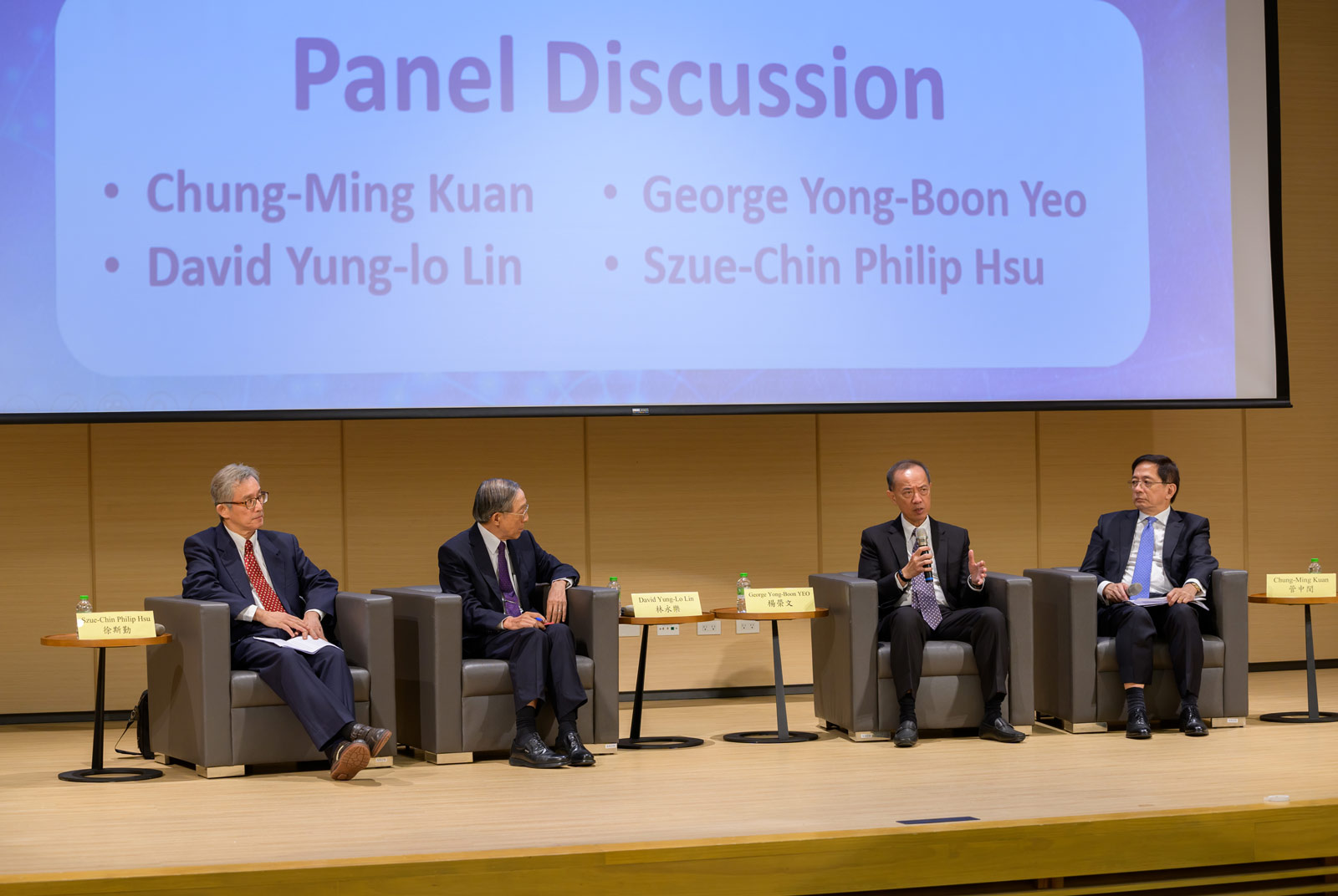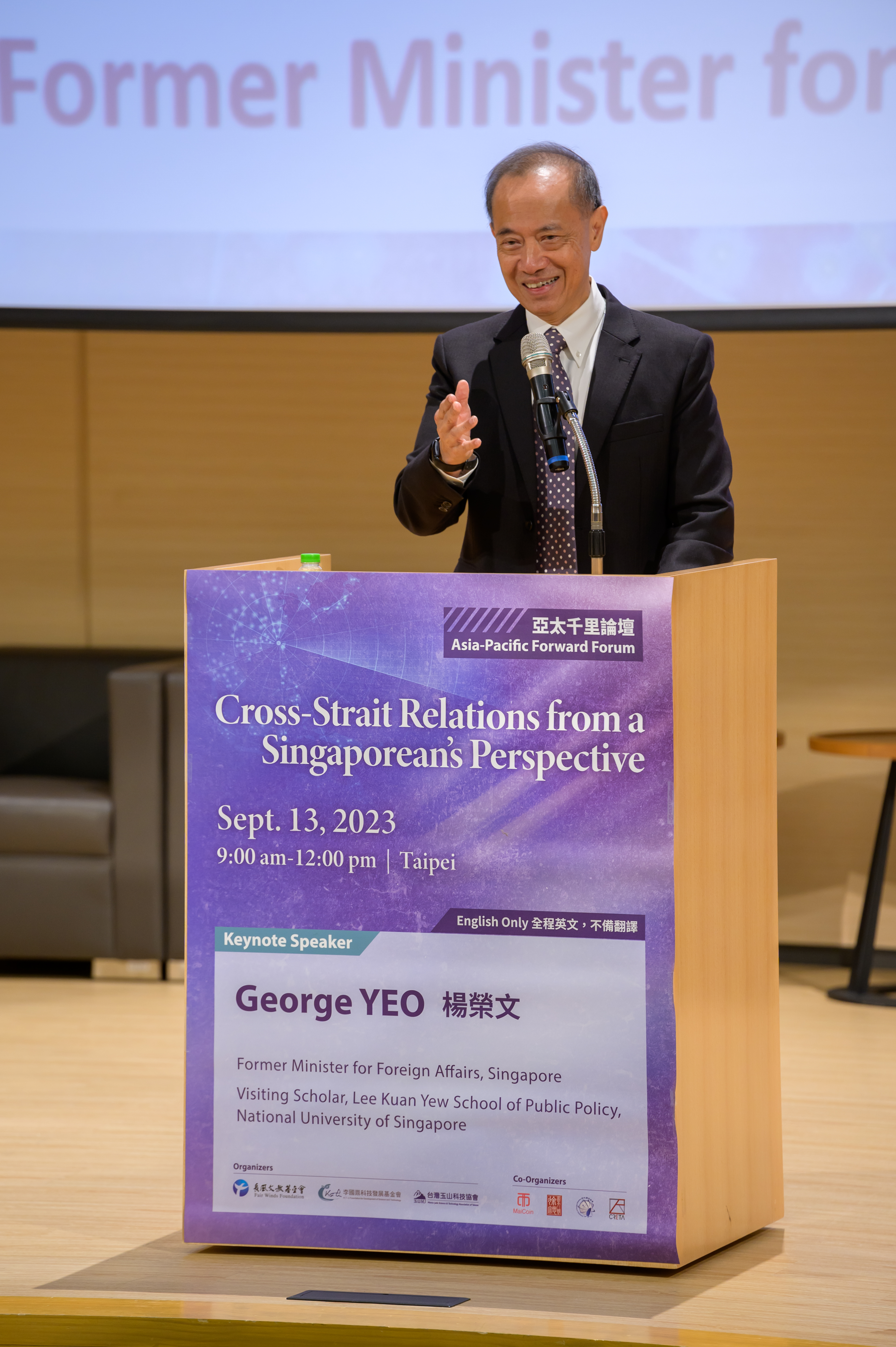Cross-strait status quo a “ticking time-bomb” - former Singaporean Foreign Secretary

Source:Asia-Pacific Forward Forum
Former Singaporean Foreign Secretary George Yong-Boon Yeo proposed a Chinese Commonwealth at the Asia-Pacific Forward Forum. It allows regular interactions between the PRC and Taiwan but faces doubts and obstacles due to controversial history and differing perspectives.
Views
Cross-strait status quo a “ticking time-bomb” - former Singaporean Foreign Secretary
By Elizabeth Frostweb only
Speaking at the Asia-Pacific Forward Forum this Wednesday (09/13), former Singaporean Foreign Secretary George Yong-Boon Yeo, said that the current status quo is “not a permanent solution” to the cross-strait relationship, advocating instead for a Chinese Commonwealth.
Drawing on Iceland’s Althingi Parliament, the British Commonwealth, and ASEAN as examples, Yeo’s proposed Chinese Commonwealth would be a “convergence of equals” allowing the PRC and Taiwan to meet regularly to develop rules for their interaction, discuss key issues, and resolve disputes, without an overall shared executive for an extended period.
Yeo hopes his proposed Chinese Commonwealth would eventually transcend political notions of the PRC and ROC, leaving simply China. In the face of fears over a future conflict in Taiwan, Yeo called on Taiwan not to allow itself to become an American chess piece: “It is better to negotiate [with China] now - the longer you wait, the weaker your negotiating position.” For Yeo, this is of particular pertinence, as convergence as equals will only be possible if Taiwan continues to be of value to the PRC - his example being the importance of TSMC and Taiwan’s semiconductor industry.
 (Source: Asia-Pacific Forward Forum)
(Source: Asia-Pacific Forward Forum)
Yeo also spoke of his personal wish to see reunification between the two sides, as he “cannot believe that Taiwanese are not Chinese.” In his view, the division between Taiwan and China exists at a political level, not at a cultural or civilizational level. No mention was made of Taiwan’s Indigenous communities.
In the panel discussion following the keynote speech, panelists Szue-Chin Philip Hsu (徐斯勤), David Yung-lo Lin (林永樂), and Chung-Ming Kuan (管中閔) responded to Yeo’s idea of a Chinese commonwealth. Kuan, the former president of NTU, said it is hard to imagine Taiwanese people accepting the idea of a Chinese Commonwealth system when the 1992 consensus remains so controversial.
Former ROC Minister of Foreign Affairs David Lin emphasized that the majority of Taiwanese people support maintaining the status quo for the benefit of Taiwan’s peace and prosperity. For Professor Hsu, Director of the Center for China Studies at National Taiwan University, restoring communication to rebuild trust between Taipei and Beijing is the topmost priority.
Ideas similar to the Chinese Commonwealth proposal have been proposed before, but have not gained much traction. Perhaps in 2011, Yeo’s final year as foreign minister, there was more space for such ideas to be accepted by both sides. However, more recent developments make this proposal less convincing as a potential route forward.
On the Taiwanese side, the 2016 election of President Tsai Ing-Wen, and subsequent opinion polls showing an increasing number of Taiwanese people identifying only as Taiwanese, suggests that unification, even under a commonwealth model, will not be welcomed by many.
What is happening in Hong Kong under a purported one country two systems model will also undoubtedly have many Taiwanese nervous about the outcomes of any attempt at reunification, even under a model that alleges to be a meeting of equals. Under Taiwan’s democratic system, public opinion should be a key consideration for any potential Taiwanese political leaders, and thus we may not see any wide support for the Chinese Commonwealth model within Taiwan any time soon.
On the Chinese side, given Xi Jinping’s call for “unification under the one country, two systems formula” in his January 2019 Letter to Compatriots in Taiwan speech, it seems unlikely that the PRC will accept a commonwealth based on the principles of converging as equals. Former Taiwan President Ma Ying-jeou, also in attendance at the conference, interrupted the panel discussion to ask Yeo if he had proposed the idea of a Chinese Commonwealth to any PRC officials. Yeo admitted that though he has mentioned the idea in some interviews, the PRC officials had no reaction, although he was insistent he believed they would consider it.
Speaking on what Taiwan can learn from Singapore, the panelists discussed Singapore’s “cold-blooded” diplomatic strategy, in particular its policy of not taking sides. Yeo said “If Singapore is forced to make a choice between the US and China, right now Singapore will choose the US. Twenty years from now, I’m not so sure.”
Concluding the event, organizer Kuan spoke of the conference’s desire to promote discussion on different approaches to cross-strait relations. George Yeo’s proposed Chinese Commonwealth may not be an idea likely to be endorsed by many Taiwanese, but the fact this conversation was held at all is a testament to Taiwan’s commitment to allowing open discussion on competing ideas.
Have you read?
- Autocracy a major blow to Chinese technology: Yasheng Huang
- “Xiplomacy” in the Shadows
- Besides Qin Gang, another Xi confidante has also been missing
Uploaded by Ian Huang






